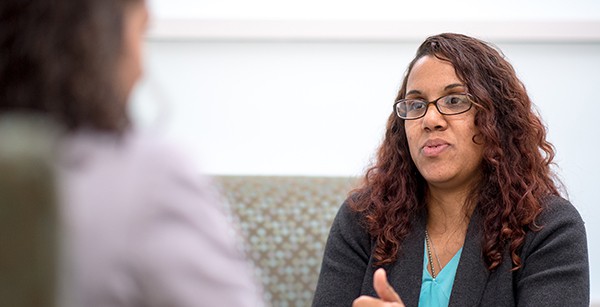Advocacy FAQs
Cleveland Rape Crisis Center’s Advocacy program helps survivors of rape and sexual abuse understand their legal options, navigate the criminal and/or civil justice system, connect with resources, and make informed decisions. If you or someone you know wants more information before reaching out for our services, read our Victim Advocacy Frequently Asked Questions below.

Jump to a question:
- What does an advocate do?
- I’m not sure I want to file a police report. If I call Cleveland Rape Crisis Center, does that mean I have to report?
- I have access to an advocate through the prosecutor’s office/police station/college. What are the benefits of a Cleveland Rape Crisis Center advocate?
- Can I have an advocate if I am not in counseling at Cleveland Rape Crisis Center?
- Where can I access Advocacy?
- Will I have to tell my advocate everything that happened to me?
- How can I get connected with an advocate?
Frequently Asked Questions
What does a Cleveland Rape Crisis Center advocate do?
As a survivor, you have rights. The role of our advocates is to believe you and help protect those rights. Your advocate will:
- Explain your rights to you and make sure those rights are being honored. (To learn about survivors’ rights, see the Ohio Crime Victims’ Rights Booklet.)
- Ensure that you are being treated with dignity and respect, and that your voice is being heard throughout the process.
- Help facilitate communication between you, the courts and/or the police.
- Explain your options, which may include filing a police report, pursuing criminal or civil charges, and/or requesting a protection order.
- Assist you with applying for victims’ compensation.
- Support you as you work with Title IX in colleges and K-12 schools.
- Provide knowledge, support, and a listening ear as you engage with the system.
- And more.
We’re here for you, every step of the way.
I’m not sure I want to file a police report. If I call Cleveland Rape Crisis Center, does that mean I have to report?
No, reaching out to the Center does not mean you have to report. Our advocates can help you understand how to report, what reporting might look like for you, and what your options are. The choice to report is 100% yours and we will support the decision you make.
I have access to an advocate through the prosecutor’s office/police station/college. What are the benefits of a Cleveland Rape Crisis Center advocate?
The Center’s Advocacy service is an independent, community-based advocacy program. Community-based advocates are survivor-focused and can connect you with a full breadth of supportive services and resources. Our advocates have in-depth knowledge about these systems and will speak up if your rights are not being honored. We will be here for you before, during, and after your engagement with the criminal justice system — and even if you decide not to file a report.
While system-based advocates (provided by the prosecutor’s office, police station, college, or other entity) can also be a resource for survivors, their services may be limited and balanced with the needs of the system they represent.
Can I have an advocate if I am not in counseling at Cleveland Rape Crisis Center?
Yes. Advocacy and Counseling Services are separate services at the Center, and you can utilize one or the other, or both. Survivors are welcome to engage with individual counseling before, during, and after they receive Advocacy, but it is not a requirement.
Every healing journey is different, and we are here to support you in every way we can.
Where can I access Advocacy?
We provide support to victims of rape and sexual abuse in Cuyahoga, Lake, Geauga, and Ashtabula Counties. We have a variety of locations in our four-county service area where survivors can meet with their advocates by appointment.
Advocacy services are currently available remotely and in person by appointment. Click here to learn about support for survivors during COVID-19.
Will I have to tell my advocate everything that happened to me?
No. Your story is your own, and it is up to you how much you share or do not share with your advocate.
Call (216) 619-6192, or request an appointment online.
